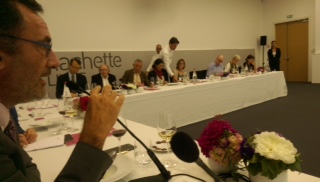The market for books whether print or digital should remain flat in the next three to five years and then decline slightly over the following decade, according to Arnaud Nourry, chairman and CEO of Hachette Livre.
But the picture could be bleaker, as books are holding up better than all other culture and entertainment sectors, he told the Association over an elegant lunch in the group’s two-year old head office in Vanves on Sept. 8.
The market decline will come as younger generations turn from reading to other forms of entertainment that will require publishers to be innovative and creative, said Nourry, who was promoted to his current post in 2003. “Almost all people read less than they used to,” he said. He is convinced that video games for mobiles hold the greatest potential for the future, which is why the group has bought three such studios in the past two years, Neon Play and Brainbow in the UK, and IsCool in France.
The e-book, which has never made serious inroads in France and is declining in the US and UK as a share of overall book sales, “is a stupid product,” he said. “It is the same as print—we (publishers) have been lazy, and need to go beyond the traditional format for telling stories.” This could include interactive books, formats combining print, video and sound.
Hachette Livre, part of the Lagardère media group, ranks third worldwide after Pearson and Bertlesmann for general public titles and textbooks, excluding the state-run Chinese conglomerates. Put another way, the group is 150 imprints around the world with 18,000 titles and 10 original languages. It has published or still publishes best-selling authors such as J.K. Rowling, Tom Wolfe, J.D. Salinger, Colette, Flaubert and Charles Darwin.
Nourry said he’s sanguine about the UK’s planned exit from the European Union (EU) in March 2019. He is not planning any changes in the way the group manages its international business for the moment, and will not revise the policy unless the UK’s economy unravels, which he does not believe will happen.
On the subject of online giants, he was more critical about Google than Amazon, against which he led and won a lengthy battle in 2014 for publishers to be able to set e-book prices. Amazon “is our leading customer, so it is not just a challenge or a problem (…) I concluded several years ago that book publishing would die if it lost control over (retail) prices.” A 1981 law in France piloted by then culture minister Jack Lang permits publishers to set prices and is generally recognized to have helped maintain cultural diversity and a solid network of about 3,000 independent booksellers in France.
Nourry was especially harsh about Google. “Amazon respects copyright, but Google does not,” and the latter has a huge team of lobbyists in Brussels trying to persuade the European Union to water down its copyright laws, Nourry said, adding that he would continue to resist pressure to weaken France’s particularly strict legislation on this score.
The prospect that marketing might supersede content would “be a nightmare,” he said. If online specialists used their Big Data to dictate which books publishers should produce, Hachette Livre would go it alone with its own platform using its databases now run by teams of dedicated specialists. He is less concerned about piracy. The music business collapsed because Apple’s iTunes started offering single tracks for 99 cents, not because of piracy, he said. Control over retail pricing is the key to survival in the culture and entertainment industries, he added.
The Hachette imprints are autonomous, but have guidelines that make ‘author care’ a top priority and also have unwritten rules about not publishing extremist or racist titles. Former National Front leader Jean-Marie Le Pen is writing his autobiography, and Nourry said he would take a dim view if any of the houses in the group planned to publish it. “Freedom to publish is in Hachette’s DNA,” but there has never been an internal policy wrangle about whether a book oversteps the mark in at least the past 40 years, he added.
Among emerging markets, the group is active in China, India and Russia, even though the first two do not have a big reading public, and is hesitant about going into Brazil. Nourry said he would reject the idea of censoring any books for the Chinese market, or anywhere else for that matter. Another important focus for Hachette Livre is the Arabic language market. At the moment, it operates in Morocco and Lebanon, publishing both in Arabic and French.
As for China’s entry into the International Publishers Association (IPA) last year, Nourry was very critical at the time in view of the country’s record in freedom to publish, which is the IPA’s mission to promote, and sees no reason to change his mind now. China was admitted to the organization under pressure from the UK, “I am not sure why,” he said. Since then, human rights in China have worsened, and more publishers and authors than ever are being arrested and imprisoned, he added.
-Barbara Casassus
